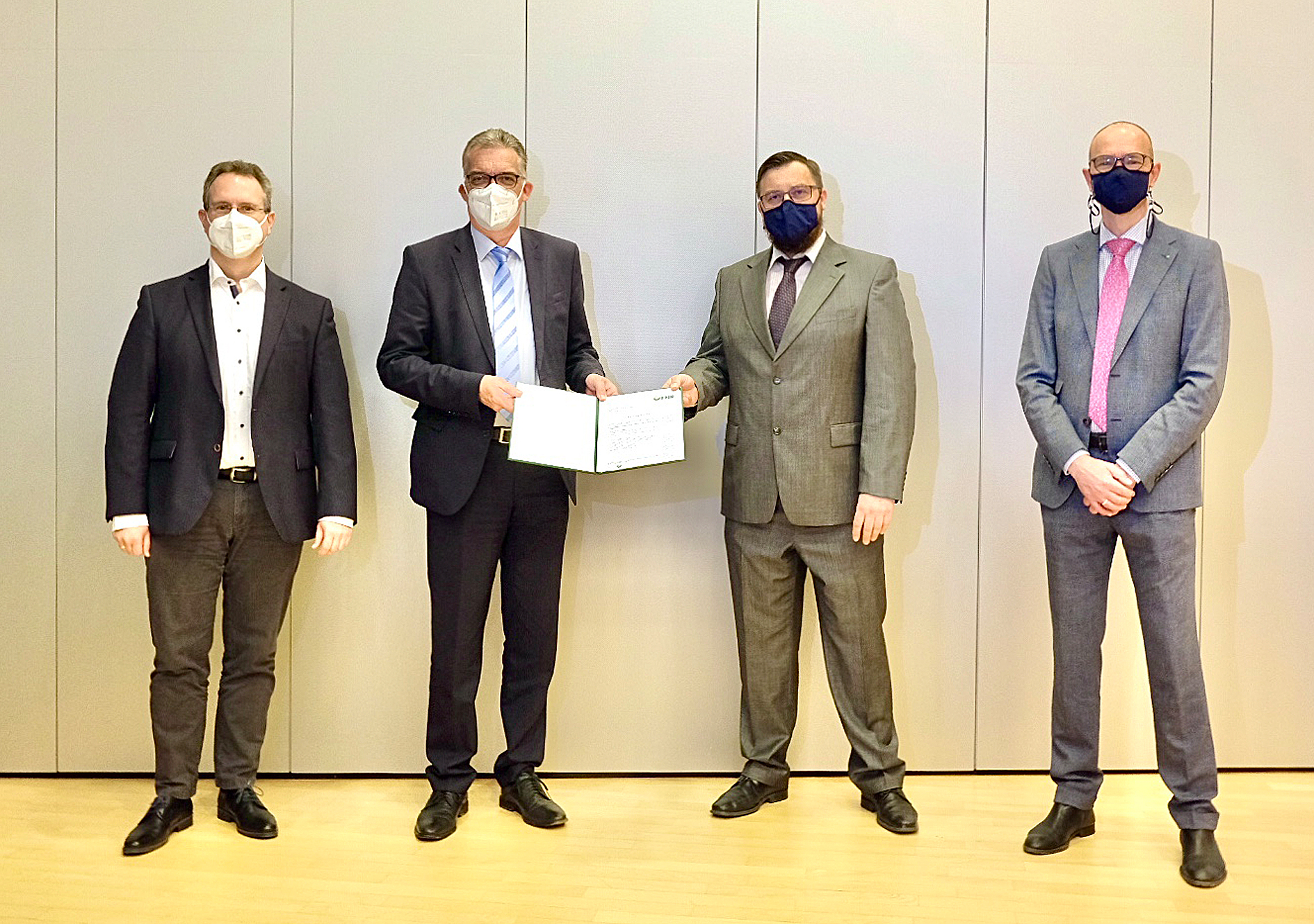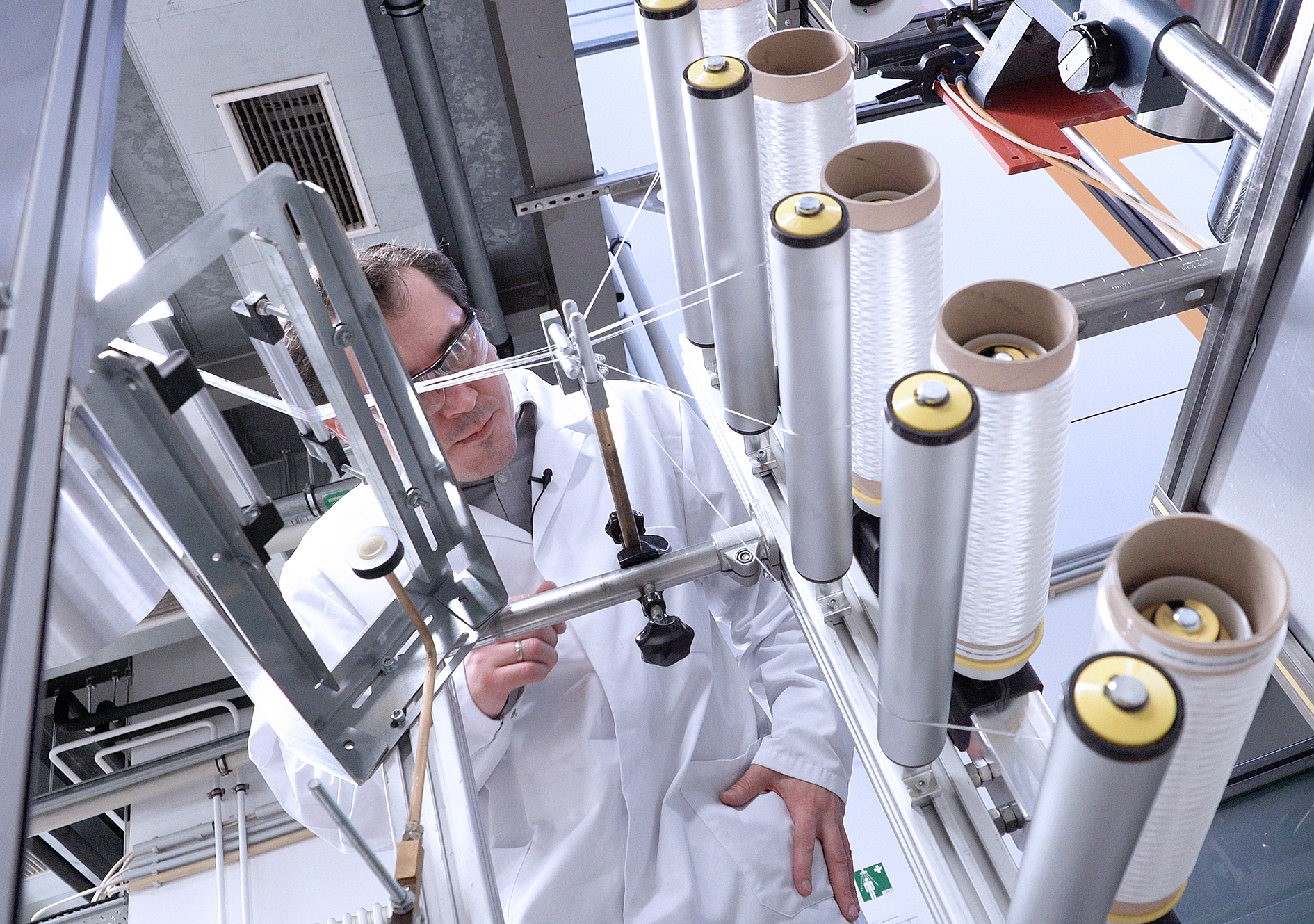Process development for melt spinning, injection molding granules and films
Fraunhofer researchers develop recyclable, fiber-reinforced material made from 100 percent bio-based polylactic acid
"Packaging made from bio-based plastics has long been established. We are now supporting the further development of these materials for new areas of application. If in the future the market also offers plant-based materials for technically demanding tasks such as vehicle construction, the bioeconomy will take a decisive step forward," explained Uwe Feiler, Parliamentary State Secretary at the Federal Ministry of Food and Agriculture, in Potsdam today. The occasion was the handover of a grant to the Fraunhofer Institute for Applied Polymer Research IAP. The Fraunhofer IAP wants to develop a composite material that consists entirely of bio-based polylactic acid (PLA) and is significantly easier to recycle than conventional fiber composites.
The German Federal Ministry of Food and Agriculture (BMEL) is intensively promoting the development of biomaterials as part of its Renewable Resources funding program. More than 100 projects are currently underway, covering a wide range of topics: from plastics that are degradable in the sea to natural fiber-reinforced lightweight components for the automotive sector. The projects are supported by the Agency for Renewable Resources, the BMEL project management agency responsible for the Renewable Resources funding program.


Easier recycling of fiber-reinforced plastics
PLA is one of the particularly promising bio-based materials. The global market for this polymer is growing by around 10 percent a year. PLA is also used, among other things, as a matrix in fiber-reinforced plastics. In these mechanically resilient plastics, reinforcing fibers are embedded in a plastic matrix.
The Fraunhofer IAP project is now focusing on these reinforcing fibers: "We are further developing our PLA fibers in order to transfer them to industrial scale together with partners from industry. These fibers are ideally suited for reinforcing PLA plastics. The resulting self-reinforcing single-component composite promises great recycling benefits. Since the fiber and the matrix of PLA are chemically identical, complex separation steps are not necessary," explains Dr. André Lehmann, expert for fiber technology at Fraunhofer IAP.
Novel PLA fibers and films are more thermally stable
The challenge with this approach is that conventional PLA has a relatively low temperature resistance. Technical fibers can be produced most economically using the melt spinning process. The Fraunhofer IAP team is now using more thermally stable stereocomplex PLA (sc-PLA) for the fibers. The term stereocomplex refers to a special crystal structure that the PLA molecules can form. Sc-PLA fibers have a melting point that is 40 - 50 °C higher and can therefore withstand the incorporation process in a matrix made of conventional PLA. In the project, the researchers are developing and optimizing a melt spinning process for sc-PLA filament yarns. The partner in this work package is Trevira GmbH, a manufacturer of technical and textile fiber and filament yarn specialties that are in demand from automotive suppliers and contract furnishers, among others. Furthermore, the development of a manufacturing process for sc-PLA reinforced flat films is planned. The international adhesive tape manufacturer tesa SE is participating in this task, and will test the suitability of sc-PLA films as adhesive foils. In a third work package, the Fraunhofer IAP will finally process the filaments in a double pultrusion process to produce granules suitable for injection molding.
Bio-based solutions for the automotive and textile industries
The scientists led by Dr. André Lehmann are certain that the self-reinforced PLA material can conquer many new areas of application. The automotive and textile industries are already showing interest in bio-based materials that are also easier to recycle. In terms of price, PLA would already be competitive here, and now the material is also to be made technically fit for the new tasks.
Professor Alexander Böker, head of Fraunhofer IAP, says: "The steadily growing demand from industry for sustainable solutions underlines how important it is to develop biobased and at the same time high-performance materials. With our research, we are also actively driving the development of a sustainable and functioning circular economy and therefore very much welcome the support from the federal government."
Information on the project is available at fnr.de under the funding code 2220NR297X.
Last modified: